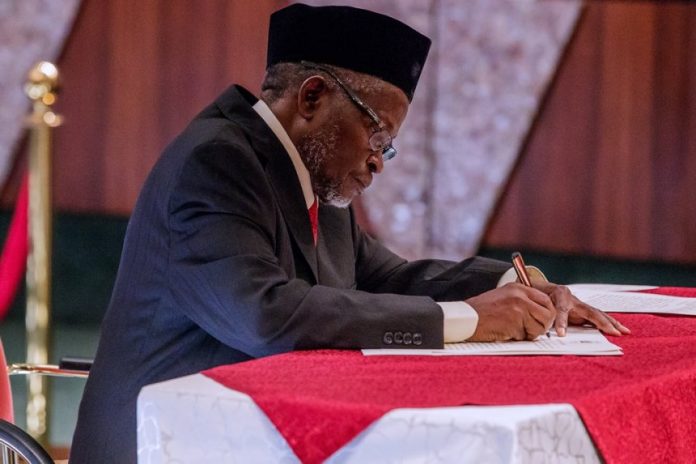President Muhammadu Buhari, the Senate and the Attorney-General of the Federation (AGF) were not in court yesterday for the hearing of a suit querying the choice of Justice Ibrahim Muhammad as the Chief Justice of Nigeria (CJN).
On May 3, Justice Inyang Ekwo of the Federal High Court, Abuja had ordered respondents in the suit to show why reliefs contained in an ex-parte motion by the plaintiff should not be granted.
In the motion ex-parte, the plaintiff – the Board of Trustees of Malcom Omirhobo Foundation — approached the court to seek “an order of interim injunction restraining the fifth defendant (Buhari) from appointing the third defendant (Justice Muhammad) as the Chief Justice of the Federal Republic of Nigeria pending the determination of the motion on notice filed herein”.
It is seeking also “an order of interim injunction restraining the 7th defendant (the Senate) from confirming the appointment of the 3rd defendant as the Chief Justice, pending the determination of the motion on notice.”
Named as defendants in the suit are: National Judicial Council (NJC), Federal Judicial Service Commission of Nigeria (FJSCN), Justice Muhammad, Federal Republic of Nigeria (FRN), President Buhari and the AGF and the Senate.
But yesterday, only three of the defendants – the NJC, FJSCN and Justice Muhammad – were represented by lawyers.
The NJC was represented by Elizabeth Jonathan, while Sani Sule announced appearance for the FJSC.
A.O Ajana, who appeared for Justice Muhammad, said he appeared in protest because his client was not served with court processes.
Plaintiff’s lawyer, Malcom Omirhobo admitted that Justice Muhammad was yet to be served with the processes and the order made by the court on May 3.
Omirhobo said other defendants had been served. He consequently withdrew the motion he filed for leave to serve Justice Muhammed through substituted means when Ajana agreed to accept service for his client.
When Justice Ekwo indicated that he would like to hear the case promptly, the plaintiff’s lawyer withdrew the motion on notice he filed for an order restraining the defendants from appointing Justice Muhammad in substantive capacity.
The judge then gave the defendants 14 days to respond to the substantive suit and adjourned hearing till June 3.
Justice Ekwo ordered that hearing notices be issued and served on parties that were not in court yesterday.
The plaintiff, in the substantive suit, is praying the court to restrain President Buhari from appointing the Justice Muhammad as the substantive CJN.
ALSO READ:CJN enjoins judges to adopt judicial infotech policy in their duties
The plaintiff contended that the Acting CJN conducted himself in a manner that reduced the confidence of the public in the integrity and impartiality of the judiciary.
It argued that President Buhari lacked the constitutional powers to unilaterally suspend and/or remove a CJN from office, as was done in the case of former CJN Walter Onnoghen.
The plaintiff is praying the court to declare that by combined interpretation of sections 1(1 )(2), 231(4), 292(1)(a)(i)(b), 153(1)(i), 158(1) and paragraph 21 (a)(b) of Part 1 of the Third Schedule of the 1999 Constitution, as amended, “it is unlawful and undemocratic for the 4th and 5th Defendants (Federal Government and President Buhari), to declare the office of the CJN vacant on January 25, 2019 and consequently appoint and swear in the 3rd Defendant as the acting CJN”.
It also wants to restrain the National Assembly from confirming Justice Muhammad’s appointment as the substantive CJN.
He is praying the court to declare that Justice Muhammad, who is the most senior jurist at the Supreme Court, is unfit to replace the sacked CJN, Justice Walter Onnoghen.
The plaintiff wants the court to declare that Justice Muhammad, having made himself available as a tool for the violation of the Constitution, especially with regards to the “illegal” removal of the former CJN, is therefore not a proper and fit person to be recommended for appointment to head the judiciary.
It prayed for: “An order, compelling the 2nd Defendant (FJSC), to select and the 1st Defendant (NJC), to recommend the most qualified Justice of the Supreme Court of Nigeria that is fit and proper, to the fifth defendant, for appointment to office of the CJN, and for the confirmation of the seventh defendant with a two third majority vote.”
In a supporting the affidavit, the plaintiff stated that unless restrained by the court, the executive arm of the government would continue to violate the extant provisions of the Constitution and sanctity of the judiciary.

 Entertainment6 days ago
Entertainment6 days ago
 Health1 week ago
Health1 week ago
 Health4 days ago
Health4 days ago
 Football1 week ago
Football1 week ago
 Crime5 days ago
Crime5 days ago
 Football1 week ago
Football1 week ago
 Education6 days ago
Education6 days ago
 Crime1 week ago
Crime1 week ago

